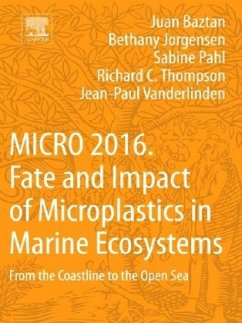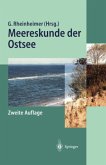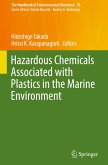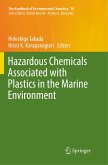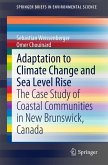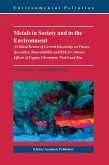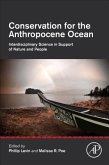MICRO 2016: Fate and Impact of Microplastics in Marine Ecosystems
From the Coastline to the Open Sea
Herausgegeben:Baztan, Juan; Jorgensen, Bethany; Pahl, Sabine; Thompson, Richard C.; Vanderlinden, Jean-Paul
MICRO 2016: Fate and Impact of Microplastics in Marine Ecosystems
From the Coastline to the Open Sea
Herausgegeben:Baztan, Juan; Jorgensen, Bethany; Pahl, Sabine; Thompson, Richard C.; Vanderlinden, Jean-Paul
- Broschiertes Buch
- Merkliste
- Auf die Merkliste
- Bewerten Bewerten
- Teilen
- Produkt teilen
- Produkterinnerung
- Produkterinnerung
Fate and Impact of Microplastics in Marine Ecosystems: From the Coastline to the Open Sea brings together highlights from the conference proceedings for MICRO 2016: Fate and Impact of Microplastics in Marine Ecosystems: From the Coastline to the Open Sea.
While the presence of microplastics in ecosystems has been reported in the scientific literature since the 1970's, many pressing questions regarding their impacts remain unresolved. This short format title draws from the shared scientific and technical material and summarizes the current research and future outlook.
Andere Kunden interessierten sich auch für
![Meereskunde der Ostsee Meereskunde der Ostsee]() Meereskunde der Ostsee89,99 €
Meereskunde der Ostsee89,99 €![Hazardous Chemicals Associated with Plastics in the Marine Environment Hazardous Chemicals Associated with Plastics in the Marine Environment]() Hazardous Chemicals Associated with Plastics in the Marine Environment269,99 €
Hazardous Chemicals Associated with Plastics in the Marine Environment269,99 €![Hazardous Chemicals Associated with Plastics in the Marine Environment Hazardous Chemicals Associated with Plastics in the Marine Environment]() Hazardous Chemicals Associated with Plastics in the Marine Environment269,99 €
Hazardous Chemicals Associated with Plastics in the Marine Environment269,99 €![Adaptation to Climate Change and Sea Level Rise Adaptation to Climate Change and Sea Level Rise]() Sebastian WeißenbergerAdaptation to Climate Change and Sea Level Rise39,99 €
Sebastian WeißenbergerAdaptation to Climate Change and Sea Level Rise39,99 €![Fate of Microplastics in Wastewater Treatment Plants Fate of Microplastics in Wastewater Treatment Plants]() Fate of Microplastics in Wastewater Treatment Plants155,99 €
Fate of Microplastics in Wastewater Treatment Plants155,99 €![Metals in Society and in the Environment Metals in Society and in the Environment]() Lars LandnerMetals in Society and in the Environment121,99 €
Lars LandnerMetals in Society and in the Environment121,99 €![Conservation for the Anthropocene Ocean Conservation for the Anthropocene Ocean]() Conservation for the Anthropocene Ocean68,99 €
Conservation for the Anthropocene Ocean68,99 €-
-
-
Fate and Impact of Microplastics in Marine Ecosystems: From the Coastline to the Open Sea brings together highlights from the conference proceedings for MICRO 2016: Fate and Impact of Microplastics in Marine Ecosystems: From the Coastline to the Open Sea.
While the presence of microplastics in ecosystems has been reported in the scientific literature since the 1970's, many pressing questions regarding their impacts remain unresolved. This short format title draws from the shared scientific and technical material and summarizes the current research and future outlook.
While the presence of microplastics in ecosystems has been reported in the scientific literature since the 1970's, many pressing questions regarding their impacts remain unresolved. This short format title draws from the shared scientific and technical material and summarizes the current research and future outlook.
Produktdetails
- Produktdetails
- Verlag: Elsevier / Elsevier, München
- Artikelnr. des Verlages: C2016-0-03453-8
- Erscheinungstermin: 5. Januar 2017
- Englisch
- Abmessung: 13mm x 164mm x 230mm
- Gewicht: 430g
- ISBN-13: 9780128122716
- ISBN-10: 0128122714
- Artikelnr.: 46447579
- Herstellerkennzeichnung Die Herstellerinformationen sind derzeit nicht verfügbar.
- Verlag: Elsevier / Elsevier, München
- Artikelnr. des Verlages: C2016-0-03453-8
- Erscheinungstermin: 5. Januar 2017
- Englisch
- Abmessung: 13mm x 164mm x 230mm
- Gewicht: 430g
- ISBN-13: 9780128122716
- ISBN-10: 0128122714
- Artikelnr.: 46447579
- Herstellerkennzeichnung Die Herstellerinformationen sind derzeit nicht verfügbar.
After earning a double degree in geology (University of Barcelona) and oceanography (University of Perpignan) in 1998, Juan went on to receive his PhD in marine geophysics under the direction of Dr. Jean-Pierre Rehault at the Institut Universitaire Européen de la Mer and the Institut Français de Recherche pour l' Exploitation de la Mer in Brest, France. His PhD dissertation, "Formation et évolution des canyons sous- marins du Golfe du Lion : relation avec les cycles glacio-eustatiques? was developed while he was working on a team led by Dr. Jean-Louis Olivet, and was presented in November of 2004. During his time as a student, he participated in eight oceanographic research cruises, including (i) the first oceanographic cruise of the research vessel Hesperides through the Exclusive Economic Zone of the Canary Islands in 1998 and (ii) in early 2000, he completed a month-long research cruise in the Bransfield Basin of the Antarctic continent.
With over 50 publications,Juan's work focuses on the evolution and current state of the coastal and oceanic system, ranging from the coast to the deep sea. Much of his work incorporates his interest in the earth-human system and investigates the ways in which humans modify "natural" processes, with a specific emphasis on ethics in relation to concerns of coastal communities.
In 2010, he joined Professor Jean-Paul Vanderlinden's research team at the Observatoire de Versailles SQY. Juan's dedication to interdisciplinary research has connected him with local, regional, national, and international experts through his work on projects such as (i) THESEUS: "Innovative technologies for safer European coasts in a changing climate" and (ii) ARTISTICC: "Adaptation to Transdisciplinary Research and Policy Community Centered Approach", this project seeks to analyze how knowledge, in all its dimensions, can be mobilized to foster coastal adaptation to climate change.
Also, since 2007, Juan has drawn from his firm commitment to collaborative, ethical, and interdisciplinary research to coordinate Marine Sciences For Society: a network of concerned scientists working to enhance the dialogue between marine scientists and society as a whole.
With over 50 publications,Juan's work focuses on the evolution and current state of the coastal and oceanic system, ranging from the coast to the deep sea. Much of his work incorporates his interest in the earth-human system and investigates the ways in which humans modify "natural" processes, with a specific emphasis on ethics in relation to concerns of coastal communities.
In 2010, he joined Professor Jean-Paul Vanderlinden's research team at the Observatoire de Versailles SQY. Juan's dedication to interdisciplinary research has connected him with local, regional, national, and international experts through his work on projects such as (i) THESEUS: "Innovative technologies for safer European coasts in a changing climate" and (ii) ARTISTICC: "Adaptation to Transdisciplinary Research and Policy Community Centered Approach", this project seeks to analyze how knowledge, in all its dimensions, can be mobilized to foster coastal adaptation to climate change.
Also, since 2007, Juan has drawn from his firm commitment to collaborative, ethical, and interdisciplinary research to coordinate Marine Sciences For Society: a network of concerned scientists working to enhance the dialogue between marine scientists and society as a whole.
Part I: Abstracts from Oral Presentations
Plastic and Restricted Heavy Metals
Citizen Research for Ocean Conservation
Microplastics in Sewage Sludge: Effects of Treatment
Sources and Fate of Microplastics in Swiss Surface Waters
Microplastics in a UK Sewage Treatment Plant
Fates of Plastic Pollution in a Major Urban River: Persistence and Bacterial Colonization of Oil-based Plastics and Bioplastics in the Yarra River, Melbourne, Australia
Presence and Abundance of Microplastics in Sediments of Tributaries of the River Thames, UK
Microplastics in Different Compartments of the Urban Water Cycle: From the Sources to the Rivers
Validation of a Density Separation Technique for the Recovery of Microplastics and Its Use on Marine Freshwater Sediments
Microplastics in Singapore's Coastal Mangrove Ecosystems
A Quantitative Analysis of Microplastic Pollution Along the South-eastern Coastline of South Africa
Plastic Pollutants Within the Marine Environment of Durban, KwaZulu-Natal, South Africa
Reading Between the Grains - Microplastics in Intertidal Beach Sediments of a World Heritage Area: Cleveland Bay (QLD), Australia
Patterns of Plastic Pollution in Offshore, Nearshore, and Estuarine Waters of Perth, Western Australia
Microplastics in Israeli Mediterranean Coastal Waters
Occurrence of Microplastics in the South Eastern Black Sea
Microplastics Migrations in Sea Coastal Zone: Baltic Amber as an Example
Simultaneous Trace Analysis of Nine Common Plastics in Environmental Samples via Pyrolysis Gas Chromatography Mass Spectrometry (Py-GCMS)
Extensive Review on the Presence of Microplastics and Nanoplastics in Seafood: Data Gaps and Recommendations for Future Risk Assessment for Human Health
State of Knowledge on Human Health Implications on Consumption of Aquatic Organisms Containing Microplastics
Effects of PVC and Nylon Microplastics on Survival and Reproduction of the Small Terrestrial Earthworm Enchytraeus crypticus
Microplastics: Who Is at Risk?
Understanding Microplastic Distribution: A Global Citizen Monitoring Effort
Marine Litter in the North Sea: Experiences With Monitoring
Voluntary Beach Cleanups at Famara Beach, Lanzarote-Fighting Marine Litter Invasion and Accumulation Locally
The Wider Benefits of Cleaning Up Marine Plastic: Examining the Direct Impacts of Beach Cleans on the Volunteers
"Agüita con el Plástico: Society as Part of the Solution of Plastic Pollution
No Plastic Campaign Makes a Difference in Island of Principe Biosphere Reserve
Logistics of Coastline Plastic Cleanup and Recycling: A Literature Review and Research Opportunities
Tackling Microplastics on Land: Citizen Observatories of Anthropogenic Litter Dynamics Within the MSCA POSEIDOMM Project
Environmental Science Education: Methodologies to Promote Ocean Literacy
Microplastics, Convergence Areas, and Fin Whales in the Northwestern Mediterranean Sea
Microplastics in Marine Mesoherbivores
Investigating the Presence and Effects of Microplastics in Sea Turtles
Microplastics Presence in Sea Turtles
Factors Determining the Composition of Plastics From the South Pacific Ocean-Are Seabirds Playing a Selective Role?
Microplastics and Marine Mammals: Studies From Ireland
Primary (Ingestion) and Secondary (Inhalation) Uptake of Microplastic in the Crab Carcinus maenas, and Its Biological Effects
Plastic in Atlantic Cod (Gadus morhua) From the Norwegian Coast
Extraction and Characterization of Microplastics in Marine Organisms Sampled at Giglio Island After the Removal of the Costa Concordia Wreck
Floating Plastic Marine Debris in the Balearic Islands: Ibiza Case Study
Enzymes-Essential Catalysts in Biodegradation of Plastics
Ireland's Microplastic
Plastic and Restricted Heavy Metals
Citizen Research for Ocean Conservation
Microplastics in Sewage Sludge: Effects of Treatment
Sources and Fate of Microplastics in Swiss Surface Waters
Microplastics in a UK Sewage Treatment Plant
Fates of Plastic Pollution in a Major Urban River: Persistence and Bacterial Colonization of Oil-based Plastics and Bioplastics in the Yarra River, Melbourne, Australia
Presence and Abundance of Microplastics in Sediments of Tributaries of the River Thames, UK
Microplastics in Different Compartments of the Urban Water Cycle: From the Sources to the Rivers
Validation of a Density Separation Technique for the Recovery of Microplastics and Its Use on Marine Freshwater Sediments
Microplastics in Singapore's Coastal Mangrove Ecosystems
A Quantitative Analysis of Microplastic Pollution Along the South-eastern Coastline of South Africa
Plastic Pollutants Within the Marine Environment of Durban, KwaZulu-Natal, South Africa
Reading Between the Grains - Microplastics in Intertidal Beach Sediments of a World Heritage Area: Cleveland Bay (QLD), Australia
Patterns of Plastic Pollution in Offshore, Nearshore, and Estuarine Waters of Perth, Western Australia
Microplastics in Israeli Mediterranean Coastal Waters
Occurrence of Microplastics in the South Eastern Black Sea
Microplastics Migrations in Sea Coastal Zone: Baltic Amber as an Example
Simultaneous Trace Analysis of Nine Common Plastics in Environmental Samples via Pyrolysis Gas Chromatography Mass Spectrometry (Py-GCMS)
Extensive Review on the Presence of Microplastics and Nanoplastics in Seafood: Data Gaps and Recommendations for Future Risk Assessment for Human Health
State of Knowledge on Human Health Implications on Consumption of Aquatic Organisms Containing Microplastics
Effects of PVC and Nylon Microplastics on Survival and Reproduction of the Small Terrestrial Earthworm Enchytraeus crypticus
Microplastics: Who Is at Risk?
Understanding Microplastic Distribution: A Global Citizen Monitoring Effort
Marine Litter in the North Sea: Experiences With Monitoring
Voluntary Beach Cleanups at Famara Beach, Lanzarote-Fighting Marine Litter Invasion and Accumulation Locally
The Wider Benefits of Cleaning Up Marine Plastic: Examining the Direct Impacts of Beach Cleans on the Volunteers
"Agüita con el Plástico: Society as Part of the Solution of Plastic Pollution
No Plastic Campaign Makes a Difference in Island of Principe Biosphere Reserve
Logistics of Coastline Plastic Cleanup and Recycling: A Literature Review and Research Opportunities
Tackling Microplastics on Land: Citizen Observatories of Anthropogenic Litter Dynamics Within the MSCA POSEIDOMM Project
Environmental Science Education: Methodologies to Promote Ocean Literacy
Microplastics, Convergence Areas, and Fin Whales in the Northwestern Mediterranean Sea
Microplastics in Marine Mesoherbivores
Investigating the Presence and Effects of Microplastics in Sea Turtles
Microplastics Presence in Sea Turtles
Factors Determining the Composition of Plastics From the South Pacific Ocean-Are Seabirds Playing a Selective Role?
Microplastics and Marine Mammals: Studies From Ireland
Primary (Ingestion) and Secondary (Inhalation) Uptake of Microplastic in the Crab Carcinus maenas, and Its Biological Effects
Plastic in Atlantic Cod (Gadus morhua) From the Norwegian Coast
Extraction and Characterization of Microplastics in Marine Organisms Sampled at Giglio Island After the Removal of the Costa Concordia Wreck
Floating Plastic Marine Debris in the Balearic Islands: Ibiza Case Study
Enzymes-Essential Catalysts in Biodegradation of Plastics
Ireland's Microplastic
Part I: Abstracts from Oral Presentations
Plastic and Restricted Heavy Metals
Citizen Research for Ocean Conservation
Microplastics in Sewage Sludge: Effects of Treatment
Sources and Fate of Microplastics in Swiss Surface Waters
Microplastics in a UK Sewage Treatment Plant
Fates of Plastic Pollution in a Major Urban River: Persistence and Bacterial Colonization of Oil-based Plastics and Bioplastics in the Yarra River, Melbourne, Australia
Presence and Abundance of Microplastics in Sediments of Tributaries of the River Thames, UK
Microplastics in Different Compartments of the Urban Water Cycle: From the Sources to the Rivers
Validation of a Density Separation Technique for the Recovery of Microplastics and Its Use on Marine Freshwater Sediments
Microplastics in Singapore's Coastal Mangrove Ecosystems
A Quantitative Analysis of Microplastic Pollution Along the South-eastern Coastline of South Africa
Plastic Pollutants Within the Marine Environment of Durban, KwaZulu-Natal, South Africa
Reading Between the Grains - Microplastics in Intertidal Beach Sediments of a World Heritage Area: Cleveland Bay (QLD), Australia
Patterns of Plastic Pollution in Offshore, Nearshore, and Estuarine Waters of Perth, Western Australia
Microplastics in Israeli Mediterranean Coastal Waters
Occurrence of Microplastics in the South Eastern Black Sea
Microplastics Migrations in Sea Coastal Zone: Baltic Amber as an Example
Simultaneous Trace Analysis of Nine Common Plastics in Environmental Samples via Pyrolysis Gas Chromatography Mass Spectrometry (Py-GCMS)
Extensive Review on the Presence of Microplastics and Nanoplastics in Seafood: Data Gaps and Recommendations for Future Risk Assessment for Human Health
State of Knowledge on Human Health Implications on Consumption of Aquatic Organisms Containing Microplastics
Effects of PVC and Nylon Microplastics on Survival and Reproduction of the Small Terrestrial Earthworm Enchytraeus crypticus
Microplastics: Who Is at Risk?
Understanding Microplastic Distribution: A Global Citizen Monitoring Effort
Marine Litter in the North Sea: Experiences With Monitoring
Voluntary Beach Cleanups at Famara Beach, Lanzarote-Fighting Marine Litter Invasion and Accumulation Locally
The Wider Benefits of Cleaning Up Marine Plastic: Examining the Direct Impacts of Beach Cleans on the Volunteers
"Agüita con el Plástico: Society as Part of the Solution of Plastic Pollution
No Plastic Campaign Makes a Difference in Island of Principe Biosphere Reserve
Logistics of Coastline Plastic Cleanup and Recycling: A Literature Review and Research Opportunities
Tackling Microplastics on Land: Citizen Observatories of Anthropogenic Litter Dynamics Within the MSCA POSEIDOMM Project
Environmental Science Education: Methodologies to Promote Ocean Literacy
Microplastics, Convergence Areas, and Fin Whales in the Northwestern Mediterranean Sea
Microplastics in Marine Mesoherbivores
Investigating the Presence and Effects of Microplastics in Sea Turtles
Microplastics Presence in Sea Turtles
Factors Determining the Composition of Plastics From the South Pacific Ocean-Are Seabirds Playing a Selective Role?
Microplastics and Marine Mammals: Studies From Ireland
Primary (Ingestion) and Secondary (Inhalation) Uptake of Microplastic in the Crab Carcinus maenas, and Its Biological Effects
Plastic in Atlantic Cod (Gadus morhua) From the Norwegian Coast
Extraction and Characterization of Microplastics in Marine Organisms Sampled at Giglio Island After the Removal of the Costa Concordia Wreck
Floating Plastic Marine Debris in the Balearic Islands: Ibiza Case Study
Enzymes-Essential Catalysts in Biodegradation of Plastics
Ireland's Microplastic
Plastic and Restricted Heavy Metals
Citizen Research for Ocean Conservation
Microplastics in Sewage Sludge: Effects of Treatment
Sources and Fate of Microplastics in Swiss Surface Waters
Microplastics in a UK Sewage Treatment Plant
Fates of Plastic Pollution in a Major Urban River: Persistence and Bacterial Colonization of Oil-based Plastics and Bioplastics in the Yarra River, Melbourne, Australia
Presence and Abundance of Microplastics in Sediments of Tributaries of the River Thames, UK
Microplastics in Different Compartments of the Urban Water Cycle: From the Sources to the Rivers
Validation of a Density Separation Technique for the Recovery of Microplastics and Its Use on Marine Freshwater Sediments
Microplastics in Singapore's Coastal Mangrove Ecosystems
A Quantitative Analysis of Microplastic Pollution Along the South-eastern Coastline of South Africa
Plastic Pollutants Within the Marine Environment of Durban, KwaZulu-Natal, South Africa
Reading Between the Grains - Microplastics in Intertidal Beach Sediments of a World Heritage Area: Cleveland Bay (QLD), Australia
Patterns of Plastic Pollution in Offshore, Nearshore, and Estuarine Waters of Perth, Western Australia
Microplastics in Israeli Mediterranean Coastal Waters
Occurrence of Microplastics in the South Eastern Black Sea
Microplastics Migrations in Sea Coastal Zone: Baltic Amber as an Example
Simultaneous Trace Analysis of Nine Common Plastics in Environmental Samples via Pyrolysis Gas Chromatography Mass Spectrometry (Py-GCMS)
Extensive Review on the Presence of Microplastics and Nanoplastics in Seafood: Data Gaps and Recommendations for Future Risk Assessment for Human Health
State of Knowledge on Human Health Implications on Consumption of Aquatic Organisms Containing Microplastics
Effects of PVC and Nylon Microplastics on Survival and Reproduction of the Small Terrestrial Earthworm Enchytraeus crypticus
Microplastics: Who Is at Risk?
Understanding Microplastic Distribution: A Global Citizen Monitoring Effort
Marine Litter in the North Sea: Experiences With Monitoring
Voluntary Beach Cleanups at Famara Beach, Lanzarote-Fighting Marine Litter Invasion and Accumulation Locally
The Wider Benefits of Cleaning Up Marine Plastic: Examining the Direct Impacts of Beach Cleans on the Volunteers
"Agüita con el Plástico: Society as Part of the Solution of Plastic Pollution
No Plastic Campaign Makes a Difference in Island of Principe Biosphere Reserve
Logistics of Coastline Plastic Cleanup and Recycling: A Literature Review and Research Opportunities
Tackling Microplastics on Land: Citizen Observatories of Anthropogenic Litter Dynamics Within the MSCA POSEIDOMM Project
Environmental Science Education: Methodologies to Promote Ocean Literacy
Microplastics, Convergence Areas, and Fin Whales in the Northwestern Mediterranean Sea
Microplastics in Marine Mesoherbivores
Investigating the Presence and Effects of Microplastics in Sea Turtles
Microplastics Presence in Sea Turtles
Factors Determining the Composition of Plastics From the South Pacific Ocean-Are Seabirds Playing a Selective Role?
Microplastics and Marine Mammals: Studies From Ireland
Primary (Ingestion) and Secondary (Inhalation) Uptake of Microplastic in the Crab Carcinus maenas, and Its Biological Effects
Plastic in Atlantic Cod (Gadus morhua) From the Norwegian Coast
Extraction and Characterization of Microplastics in Marine Organisms Sampled at Giglio Island After the Removal of the Costa Concordia Wreck
Floating Plastic Marine Debris in the Balearic Islands: Ibiza Case Study
Enzymes-Essential Catalysts in Biodegradation of Plastics
Ireland's Microplastic

